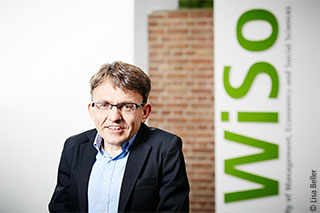Professor Dr. Bernd Irlenbusch, professor and director of the Department for Business Development and Business Ethics, comments in an article in the German magazine "Personalwirtschaft" on the problem of white-collar crime in companies. In doing so, he cites opportunities to create better framework conditions for the avoidance of criminal or morally incorrect developments in companies.
"For example, companies should clearly define the maximum amount of gifts that employees can accept," is Irlenbusch's concrete suggestion - because otherwise there is a risk that employees could gradually accept even bigger gifts. A phenomenon that has been repeatedly mentioned in connection with the VW emissions scandal is the so-called "slippery slope effect", as demonstrated by Francesca Gino and Max Bazerman (Harvard University). This effect describes that it is less likely that ethically dubious activities will be criticized by others if morally wrong behaviour slowly and gradually creeps in.
"It is also important to adopt a realistic attitude. 'We're good, but not as good as we could be yet' is, in my opinion, a healthy attitude for a company. After all, nobody is super great," says Bernd Irlenbusch. This would be a sign of premature satisfaction with what has been achieved.
In addition, companies should not demand loyalty at all costs, but instead convey to their employees that they could contribute their own personal values.
"You can prevent people from behaving almost schizophrenically," says Irlenbusch. "That means: in the company different than at home."
According to Irlenbusch it is not enough to have a good corporate code of conduct, whistleblowing systems and employee training to ensure that employees abide by the rules. It is also important to strengthen the informal corporate culture.
Information about the article:
"White-collar crime: black sheep in the workplace" by Georg Berger and Nándor Hulverscheidt, in: Personalwirtschaft 10 / 2017, p. 47-49.
White-collar crime in companies
